#including Kelly being adorable with the knitting box
Text

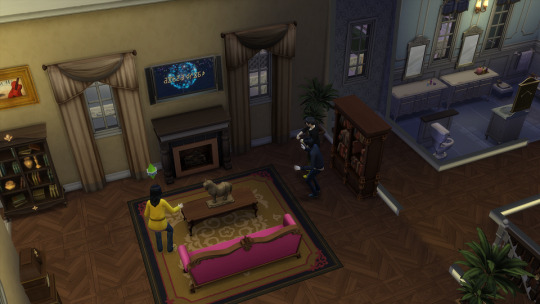
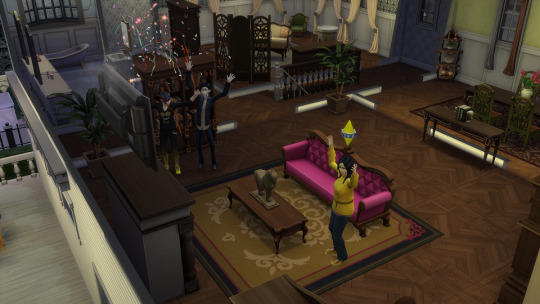
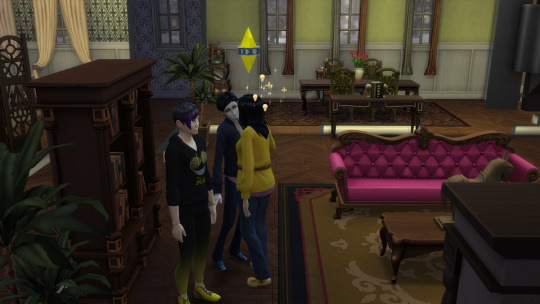
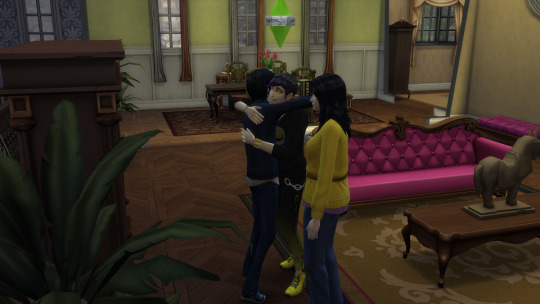




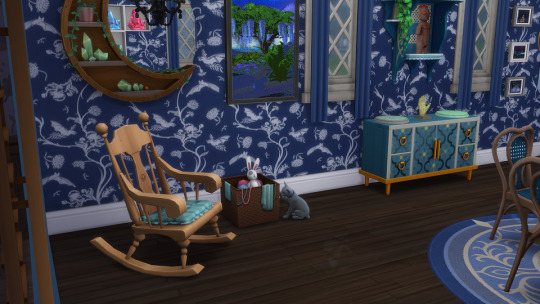
-->But oh shit – all that took long enough that it was 11:30 PM! AKA prime “Countdown to Midnight”-watching time! I couldn’t have the gang (in particular Smiler) miss it AGAIN after what happened at the dance party last time! So I quickly slapped a TV into the sitting room upstairs in the house, then had Victor and Smiler teleport there and Alice use her super speed to run up to meet (unfortunately, she can’t tunnel into actual buildings – and DEFINITELY not onto the second floor!). Fortunately, they all arrived in good time, and everyone got to witness the countdown to midnight and properly celebrate this time around. :) Alice gave Victor a kiss on the cheek, and Smiler gave them a hug, aww. :) Seriously glad they made it – I would have been sad if they’d missed out on that tradition AGAIN.
-->And with that, it was time to head home! Alice made some Italian meatballs as both she and Victor were feeling hungry; Victor checked on the greenhouse and took the cone off Kelly; and Smiler entertained the kittens before heading to the barn to make some computer chips and mechanisms. Victor and Alice then went to bed as the holiday ended on a successful note for all of them. And Kelly adorably batted at the knitting box in the seance room. XD Might as well end on a cute note, right? Next time -- well, I happen to have played the next session on Black Friday, so it only felt right to do the gang running their grocery store. XD We'll see you then!
#sims 4#the lazy save#victor van dort#alice liddell#smiler always#yeah I noticed the time right around when I finished setting up the picture#and was like 'oh shit'#'well I kind of wanted to buy a TV for that house anyway so'#'CHOP CHOP SIMS MOVE IT'#fortunately they all made it in time and were able to PROPERLY celebrate watching the countdown :)#I'm glad I like watching the final countdown on New Year's myself#and yeah after that just a bit of chilling out at home#including Kelly being adorable with the knitting box#I think cats actually can knock balls of yarn out of it#don't think Kelly managed that#but we'll see what happens in future#and yes technically 'Black Friday' fun next time#goodie XD#queued
2 notes
·
View notes
Photo


McCall’s, January 1955
Article by Isabella Taves | Photo by Christa
Grace Kelly can be plain-jane or beautiful, self-assured or scared to death, icy or outgoing, but the public has just one word for this exciting new movie star - wonderful!
A slender young woman from Philadelphia, with fierce determination and gentle ways, has set a new style in movie stars. Her name is Grace Kelly. Refreshingly enough, it’s her real name.
Hollywood recently has produced a rash of little-girl heroines with little boy haircuts, and a series of well-developed sirens with low-cut necklines. Against these Grace is refreshing too. She is a lady - but a lady with talent and fire. Some people compare her to the early Ingrid Bergman. Certainly, nobody since Bergman has hit Hollywood with such impact or is in such demand. (In a little over a year Grace has already played opposite such box-office favorites as Clark Gable, Ray Milland, Gary Cooper, Jimmy Stewart, Bing Crosby, William Holden, Stewart Granger and Cary Grant, and the line forms to the left.)
But Grace isn’t like Ingrid Bergman early or late - or anybody else, for that matter. She is a complex girl, a shy introvert, whom nobody knows completely. Her family sees one side of her, the people with whom she works see another, and her best friends - mostly girls she met when she first lived alone in New York see another. Which is the real Grace Kelly? Says she, “Give me time. There isn’t any real Grace Kelly yet. Come around in ten years!”
Nevertheless, nobody denies that she has her own secret and very powerful weapon. Part of that weapon is her determination. Grace decided she was going to be an actress when she was eleven years old. Nobody in the family took her seriously. That is because all her family are ham actors at heart.
Grace was in school theatricals and starred with a local amateur group. But her sisters acted too. Once, when Grace had a featured role in The Women, she came down with measles on the night of the dress rehearsal and her older sister Peggy stepped into her part. The whole Kelly family can memorize lines like a flash. Neighbors say that when the four children were all living at home every night was amateur night, with the youngsters and father Jack Kelly vying with one another to get the floor.
One day when Kell (Grace’s only brother, who is two years older than she) was invited to a Main Line debutante tea his three sisters almost talked him into staying home by staging a preview of the party. Grace played the debutante, Lizanne (two years younger than Grace) played the dowager mother, and Peggy played Kell - falling all over everybody and disgracing himself.
Although Grace’s father never had any more than a grammar school education, he wanted all his children to go to college. Grace decided on Bennington, in Vermont, because of its drama and dance courses. But she flunked math - always a blind spot with her - on her college board examinations. Rather than settle for any other college, Grace set her determined little chin (her worst feature photographically, one of her best assets as an actress) and said she wanted to go to New York to study acting at the American Academy of Dramatic Arts.
Mrs. Kelly gave in, reluctantly. For one thing, the Kellys are a close-knit family (so far Grace is the only one who has left home). For another, both Mr. and Mrs. Kelly felt acting was a hard, overcrowded field. “But she had never wanted anything so badly before,” says Mrs. Kelly, “so we couldn’t hold out.”
At the Barbizon Hotel for Women, where Grace lived in New York, a model named Carolyn Scott had the room next door. They became close friends. (Carolyn is married now, with two children, and Grace is the godmother of her first child.) They exchanged confidences. Carolyn didn’t take Grace’s acting too seriously either, although she loyally attended all Grace’s plays at the Academy. She encouraged Grace to work as a model in the afternoon, after school. Grace was so good at modeling that eventually she was to earn up to $25 an hour, but she still haunted the Broadway casting offices.
Two years went by, and at last, she got a part with Raymond Massey in The Father.
Carolyn says, “I went opening night. Though I knew how thrilled Grace was, I didn’t expect to get goosebumps myself. But when she walked out on the stage, looking so fresh and pretty and heartbreaking, I burst into tears. I think it was then I realized that she was going places.”
The Father ran only two months, but that was all Grace needed. Fred Coe, producer of several television playhouse dramas, saw her and snapped her up. There was no question in his mind that she was going places. He says today, "She had talent and attractiveness, but so do a lot of other young people in the theater who never become stars. The thing that made her stand out was something we call style. She wasn’t just another beautiful girl, she was the essence of freshness - the kind of girl every man dreams of marrying.”
And then he added, “We all loved her. You can’t work with Grace Kelly without falling a little in love with her.”
That is the second part of Grace Kelly’s secret weapon. She looks lovely, and she is lovely. And fresh and nice and unspoiled. Long before the moviegoing public recognized her, she was a sensation - a genuine bona fide sensation in Hollywood, where she is under contract to M-G-M. Producers and directors and leading men capitulated the minute they started to work with her. She was in such demand throughout the industry that she rushed from one studio to another, making pictures on location from Africa to London to France to South America, and only took a breather finally because she was too exhausted to stand up before another camera.
A publicity woman in Hollywood told me, “She is completely devastating. She knows her lines, she gets there on time without headaches or hangovers, and she is considerate of everybody, from the producer to the lowliest grip. It is the most inspired technique I have ever seen for getting ahead in an industry which is hagridden by geniuses and stars who think they have to act like stars. I wonder why nobody ever thought of it before?”
The final triumph of her secret weapon was when she, a newcomer in Hollywood, got the coveted female lead in The Country Girl, with Bing Crosby and Bill Holden. Every actress out there went after the role—except Grace. She wanted it as much as anybody else, but she told roommate Rita Gam, "I’m not big enough yet to ask favors or tell them I want certain roles. I’ll just have to wait and hope.”
Bing Crosby, normally uncommunicative on the set, was not proof against Grace Kelly’s secret weapon. Usually, between takes, he sits in solitary in his dressing room reading bird books. But during The Country Girl, he never left the set. He and Grace and Bill Holden were around together all the time, lunched together, had tea on the set every afternoon.
Bing, who is old enough to be Grace’s father (and who, in fact, knew Grace’s father a long time before encountering his little daughter), once remarked, “If I were only twenty years younger.” Unable to do anything about that, he plays the role of family friend. When Peggy was visiting Grace he took the girls out on the town, one of Grace’s rare appearances in Hollywood nightlife. Photographers took a picture of the three of them sitting at a table, then carefully snipped Peggy out of the print, which ran in newspapers all over the country under the heading: Hollywood Romance. It was not the best picture ever taken of either of the principals. Said Grace, surveying her prominent chin coldly, "I look as if I had just thrown up.”
Grace has been linked in gossip columns with other of her leading men, including Clark Gable and Ray Milland. That is mainly because names make news. Whatever Gable’s emotions when he and Grace met on location in Africa for Mogambo and she knitted him a pair of red socks for Christmas, he now occupies the solid position in Grace’s life of a kind of Dutch uncle. When a New York newspaper columnist reported, with complete inaccuracy, that Clark had given Grace a diamond bracelet, Grace had such a comfortable relationship with Clark that she called him up and teased, "Where is it? I’m waiting.”
What the columnists didn’t report was the number of men whose names don’t make news who also became devoted to Grace. When she was making Rear Window (with Jimmy Stewart) an enamored song-plugger darted on the set each morning with a bunch of flowers for her, blushingly pretending they were from his garden. And on the Country Girl set the grips and camera crew became so fond of her that when she didn’t win the Academy Award for which she had been nominated last March (for her supporting role in Mogambo) they chipped in and bought her a big plaque, on which was engraved: “To our Country Girl - may this hold you over until next year’s Academy Awards.”
Grace has, by her own admission, been in and out of love several dozen times, but never deeply enough to want to get married. She has never been engaged. Grace loves children; she has four godchildren, whom she adores - and she thinks being married is the only life for a woman. But she has frustrated a long line of eager applicants by gently sidestepping the big question.
It is the more annoying because Grace loves weddings and usually cries harder than anybody else at one. Her bridesmaid appearance at Peggy’s (when Peggy was nineteen and Grace was fourteen) was definitely sodden. And when her brother Kell was married last spring and she couldn’t attend because of schedules on The Country Girl she had the only fit of temperament on the set that has been reported to me "until I had a good cry and got it out of my system,” says Grace.
"Her phone rings constantly,” says Peggy. “I know because I had to answer it in Hollywood. But she almost never went out. Even when she had a night off she would rather go out for a big dinner with me and have a lot of laughs. Family laughs.”
In the television days in New York, where Grace had an apartment on East Sixty-sixth Street, Grace was not a celebrity. “Taxi drivers and people on the street used to look at me funny, as though they recognized me, but they never knew my name.” She had more than the average allotment of beaus, though. She and Prudy Wise, whom she met at the Barbizon and who now lives with Grace and acts as a part-time secretary, had an answering service. When Grace was home she used to pick up the telephone and listen in to find out who was calling before she would come on the line.
"Men get annoyed at her,” Carolyn Scott (now Mrs. Malcolm Reybold) admits, "and they come complaining to me about how cold Grace is. Actually, Grace is far from cold. I think it’s just that she’s a single-purpose girl. And right now her purpose is to succeed as an actress.”
An actress who went on a few double dates with Grace reports. “She would be just darling and lots of fun. But let a man begin to get ideas and she’d reach in her bag and pull on her horn-rimmed glasses and put on the clipped English she learned for Mogambo. I have never seen such an efficient technique for freezing a wolf. No wonder she gives the impression of being cold.”
Inside, however, Grace is soft, the greatest sentimentalist in her family. All the Kellys cry at movies, but Grace is the ranking four-handkerchief girl. Once, when the girls were little, they forgot their handkerchiefs [while] at a movie. Grace and Peggy put baby Lizanne between them and wept into her cotton petticoat.
The attic of the Kelly house in Philadelphia is filled with Grace’s old scrapbooks - up to and including her first corsage - and her old dolls. Peggy has tried to get one or two of those dolls for her own two little girls with no success. Grace will buy her nieces new dolls, but she won’t part with the old. She also confesses that when she was small she loved her dolls so much she didn’t want to play with them - for fear of getting them dirty - and would use Lizanne’s whenever she had a chance. Grace collects things - clothes, shoes, pictures, letters. When her efficient mother offered to go to New York, while Grace was in Hollywood, and clean out her closets and dresser drawers Grace flared. “Don’t you dare! If you throw out even one old piece of Kleenex I’ll never forgive you.”
Grace has puzzled Hollywood for a number of reasons. First, she lives like a young actress instead of a movie star. She and Prudy Wise took a furnished apartment in Hollywood, a very simple apartment with one bedroom. It was November and they were cold because they didn’t have enough blankets. Instead of going out and buying some (which Grace, on her estimated $750 a week, might have done without hopeless damage to her budget) the girls slept in their coats. Finally, a friend took pity on them and brought over some blankets his children used to take when they went camping. “They were full of holes and sand,” Grace says, “but don’t think we weren’t thrilled to get them.”
She drove a small rented car and, because she hates to drive and doesn’t do it very well, tells friends that her very first extravagance when she gets to be a big star will be to hire a car and chauffeur “even before I get a maid, for I’d rather make beds and wash dishes any day than drive a car.”
After she came back from making Mogambo in London and Africa Grace wanted an organdy stole. After shopping around she decided they were all too expensive, and sat down and made her own. She likes to buy new clothes, but she does it on a very modest scale because she gets fond of her old things and feels comfortable in them.
She always has somebody living with her, whether it be a visiting sister, her mother, Prudy Wise or Rita Gam. When she goes to Hollywood cocktail parties she invariably turns up with her roommate or a female relative and spends most of the time sitting in a corner talking to her. At a Christmas dinner given by a young married woman who works at Paramount, Grace shunned the company of grownups and spent most of her time with the children.
The only men she dates are those she grew fond of while making pictures (notably Crosby and Gable) or old friends from New York.
Grace is genuinely shy and diffident. She hates to talk about herself, even to old friends. After her African trip, she went through a phase of refusing all invitations for fear people would expect her to deliver a travelogue on the country. Even Grace’s family had trouble getting much out of her. Her father told me, “You know the girl must have had a lot of fascinating experiences, but she just won’t talk.”
It cannot help but follow that Grace is the despair of press agents and interviewers from magazines and newspapers. "I hate text pieces about myself,” she told me, and later informed a photographer, "I hate posing for pictures.” Her good manners make it impossible for her to break a promise to see someone from the press, but she shies away from any subject that comes close to verging on the personal. You can come away from a series of interviews with Grace with a collection of the most uninteresting platitudes ever assembled from anybody in the public eye.
One reporter spent the better part of three weeks trailing Grace and talking to her. After it was over he tossed his notebook on the table and said to her, "There’s nothing here worth printing!”
Grace replied mildly, "I don’t think I’m very interesting either.”
A male magazine writer, watching her go over costume sketches, asked chattily if she wore falsies. Grace was so shaken and embarrassed she wouldn’t see him again.
She feels less shy with women. But a talk with the press is always an ordeal, and she usually tries to surround herself with friends or family when reporters are around.
Once, when she and Prudy Wise were lunching with an older woman writer from a women’s magazine, Bing Crosby was sitting at a nearby table. To tease Grace he kept sending notes over. Prudy, who is as uncomplicated as a puppy, kept giggling and answering them. Grace got more and more tense and embarrassed. Finally, the writer leaned over and told her, "Dear, if you feel the need of protection from that man you can come to me. I’m home every night.”
Afterward, in the privacy of her own bedroom, Grace tells a story like that very well and gets as giggly as the next girl. She also loves silly jokes on old friends. When she first moved into her New York apartment and was taking her time about buying furniture she used to dress up like a character from a Charles Addams cartoon and meet her dates in a bare room lighted only by a candle in an old bottle. Another time a beau called and found her and her roommate made up as corpses and laid out in sheets on the bare living room floor.
But it is only with old friends and family that Grace relaxes. "I can always tell when Grace is unhappy,” Carolyn Scott told me. "She gets kind of a glaze on her and begins to look like a china doll. A china doll that has been on ice a long time.”
When Grace was in one of her typical speed dashes last spring, finishing Green Fire (with Stewart Granger) and on her way to France to make [To] Catch a Thief (with Cary Grant), she was met at the airport by a newspaperwoman who asked, at eight o'clock in the morning, "Tell me, Grace, do you hunt men in Hollywood the way you hunted lions in Africa?”
At moments like this Grace gives the impression of being a very cold and determined little package. One Hollywood director was quoted as referring to Grace Kelly’s "stainless steel insides.” Grace, who is sensitive about almost every story printed about her, was deeply bothered. "I’m stubborn,” she says, “but I don’t think I’m cold or hard. That was cruel.”
The only way to learn anything about what makes Grace tick is to talk to her friends and relatives. The explanation for a great many things about her, including her determination and shyness, lies in her exuberant, extroverted family. She is number three of four children. Peggy, four years older than Grace, (Grace was twenty-five on November 12) was always her father’s favorite, the best of all the girls in athletics, a talented painter, and a natural clown. Grace’s father still says in bewilderment when he sees Grace’s name in lights on movie marquees, "I thought it would be Peggy. Anything that Grace could do Peggy could always do better.” Grace adored her older sister, counted on her help in arguments with the baby, Lizanne, and copied her taste in hairdos and clothes.
"She was a wonderful sister,” remembers Peggy. "She would always do things for me. Sometimes I wonder if I imposed on her.”
Brother Kell – John B. Kelly, Jr. – was also an object of hero-worship for Grace. She watched his athletic honors with pride and went on dates with his friends. But she also envied his stature in the family, because he was the only boy. And their father, Jack Kelly, had a particular reason for wanting a boy.
John Brendan Kelly, Sr. came from an Irish family which included producer-playwright George Kelly (Craig’s Wife, The Torchbearers, The Show-Off) and an older brother, Walter, who was in vaudeville. But Jack never had more than a grammar school education and started his career as a bricklayer. He was always a fine athlete, however, and, after World War I, in which he distinguished himself as a boxer, went to England to compete in the Diamond Scull races. At the last minute, he was disbarred from competition because he was not a "gentleman,” having worked with his hands. He went on to win the Olympics, beating the winner of the Diamond Sculls, but the insult rankled.
From the time Kell was six his father coached him in sculling. Just twenty-seven years after Jack Kelly, Sr. had been disbarred from competing in the Diamond Sculls, he and his family stood on the banks of the Thames and saw young Kell, a "gentleman” from the University of Pennsylvania, win the Diamond Sculls by eight lengths. He did it again in 1948, and now, at twenty-seven, an extraordinary physical specimen like his father, is the five-times American and Canadian sculling champion. He has never won the Olympics, however, but on his second try he met the girl he married, a swimmer on the American team.
Baby sister Lizanne was probably the greatest challenge to Grace. Lizanne is acknowledged even in the Kelly family as a leader. She has recently gone through the University of Pennsylvania collecting honors, from the captaincy of the baseball team to the presidency of her sorority, Kappa Kappa Gamma. From the time she was small, she was an excellent manager. ("She knew how many pieces of luggage we were traveling with from the time she was five years old,” her father boasts.) But she was a trial to the gentle and willing Gracie. She took dolls away from her - from Grace, who loved her dolls so.
Sometimes Peggy intervened on Grace’s behalf. But she wasn’t always around. And Grace, who grew up far less strong than her fierce little sister, had to develop an inner strength and self-sufficiency which friends admire in her today. One day Lizanne, in a fit of childish temper, locked Grace in a closet and went out to play. Several hours afterward she remembered Grace was still locked up and ran to their mother. But when Mrs. Kelly opened the door Grace looked up smiling. She had found some dolls on a shelf and had spent the time playing happily.
Later, when Grace came to New York, her mother urged her to look up her Uncle George, who by that time was famous. Grace refused. She was determined to make good on her own. And, although her father had made many friends among theater people in the sculling days, Grace refused to allow him even to write them about her. Grace’s mother says she will never get over the night they went up to Boston for the out-of-town tryout of The Father.
“We had called Grace,” Mrs. Kelly remembers, "and told her to invite the cast over to our hotel suite for supper after the show. When Raymond Massey arrived he was delighted to see Jack. Massey used to row for Toronto, and all old oarsmen know each other. But he didn’t understand why Jack was there. It took him several minutes to realize that he was Grace’s father, for Grace hadn’t said a word.”
Grace preserved this same silence later with Bob Hope and Bing Crosby. It is part of her quiet, stubborn creed that she must stand or fall on her own. Although she is deeply devoted to her family, she is the one who has broken the pattern.
Grace’s father is wealthy, a Philadelphia contractor who has built many important buildings, including the Thirtieth Street railway station. In 1935 he ran as the Democratic candidate for mayor, building up a big vote in a Republican stronghold. Later, under President Roosevelt, he ran a national physical-fitness program. Now a Philadelphia park commissioner and president of the Atlantic City, New Jersey, race track, Jack Kelly still has color, glamour, and drive.
Mrs. Kelly, whom all three girls resemble physically, dreamed of being a dancer, but she gave up that dream for the more practical one of teaching physical education. She was the first woman head of the physical education department at the University of Pennsylvania and was so pretty that she was seen frequently on the covers of Country Gentleman and Farm Journal. (To the readers of the latter she was known as “Peaches.”) German-born Mrs. Kelly was, in her way, just as strong a character as her husband. She says calmly today, “I wasn’t the sort of mother who waited to discipline the children until their father came home.”
Grace is glad today for that disciplined upbringing and for her convent training. She says seriously, "The people I know who respect their parents are the ones who were brought up strictly.” But, in her own way, Grace has defied the Kelly training.
Although Jack Kelly taught all his children the value of a dollar and had them managing finances from the time they were small, math and money are subjects that have eluded Grace. She is naturally careful with small amounts, but when it comes to big ones she is hopelessly at sea. Her father advises her on investments and her mother keeps an eye on Grace’s bank accounts.
Grace has also resisted her father’s generous habit of buying clothes for his wife and daughters and, now, his granddaughters. "Daddy has wonderful taste,” Peggy and Lizanne assured me and added they were always thrilled to wear the extravagant things he bought them. But Grace, from the time she was ten, was critical. She would not like the color of a dress he’d bought and would change into a skirt and sweater she’d owned five years. While all the rest of the family were sporting the new bathing suits Dad had brought home for the Fourth of July, Grace would insist on wearing her old one.
In fact, Grace, who at times can be breathtakingly beautiful on the screen, in real life can look like a plain-jane with her hair pulled back, wearing her horn-rimmed glasses and old clothes.
Grace’s half-smiling explanation is that she is loyal to her old clothes, just the way she is loyal to old friends. But her father, a fiercely determined man himself, knows that’s not the whole story. He understands that anything she achieves she must do herself, without his help. Although he is mildly astonished still to discover that Grace is the one who inherited the same relentless drive that goaded him to success, he is also proud.
"Why,” he says, standing before the John B. Kelly construction company and looking over the modern Philadelphia which he helped build, “do you know what I’m known as around here these days? I’m Grace Kelly’s dad.”
THE END
#grace kelly#mccall's january 1955#christa (photographer)#isabella taves (writer)#vintage#sheila scan#sheila edit
61 notes
·
View notes